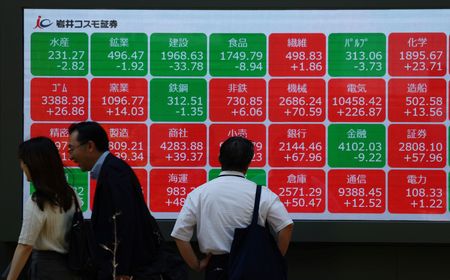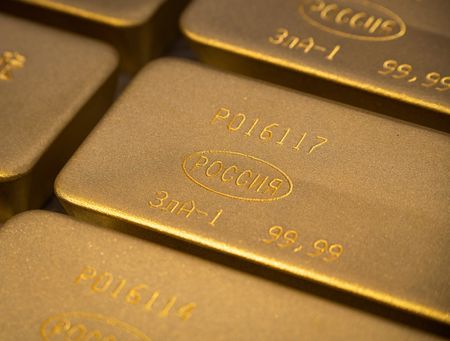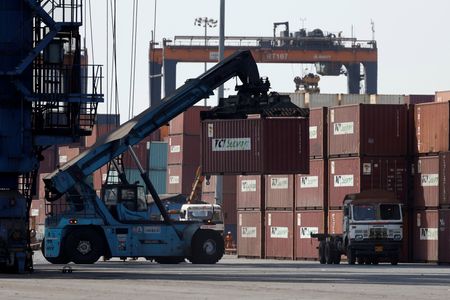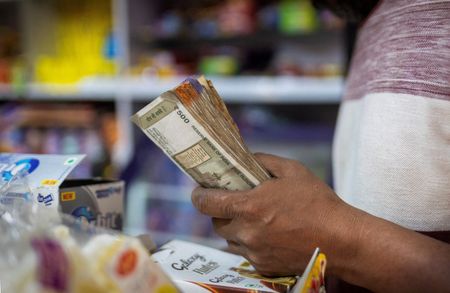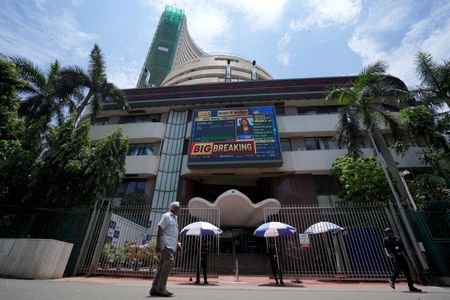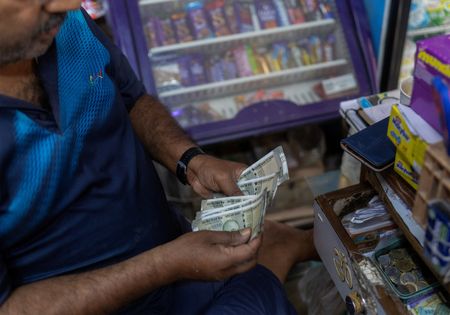By Amanda Cooper
LONDON (Reuters) -A rally in global stocks and the dollar lost some momentum on Tuesday, as initial euphoria over a trade truce between the United States and China gave way to the persistent concern among investors over the impact of the standoff on the global economy.
The world’s two largest economies have initiated a 90-day pause in their trade war, bringing down reciprocal tariffs and removing other measures while they negotiate a more permanent arrangement.
The agreement has reignited investor appetite for stocks, cryptocurrencies and commodities, unleashing a 3.3% rally on Wall Street the previous day.
By Tuesday, some of that enthusiasm had ebbed, leaving European stocks up 0.2% in early trading, boosted by upbeat corporate results from the likes of German pharma group Bayer and Danish wind turbine maker Vestas, which both rose 10%.
Futures on the S&P 500 and Nasdaq fell 0.4%, underscoring the caution towards U.S. assets.
“It’s the pause that refreshes and makes you feel better. You just hope that there is more to come. It does show you that this administration is not immune to market volatility. It does have a breaking point,” IG chief market strategist Chris Beauchamp said.
Following the Geneva talks, the U.S. said it will cut tariffs imposed on Chinese imports to 30% from 145% while China said it would cut duties on U.S. imports to 10% from 125%.
Ratings agency Fitch estimates the U.S. effective tariff rate is now 13.1%, a notable decline from 22.8% prior to the agreement but still at levels unseen since 1941 and above the 2.3% that prevailed at the end of 2024.
The U.S. government went one step further on Tuesday, announcing it will cut the “de minimis” tariff on Chinese shipments of items valued at up to $800.
The broader markets offered little reaction to this latest U.S. concession. Shares in Amazon eased 0.5% in premarket trading, following Monday’s 8% rally.
FAREWELL ‘CRAZY US EXCEPTIONALISM’?
Trump’s unpredictable approach to the economy, trade and international diplomacy have fanned concern about the outlook for U.S. growth. Together with a lack of progress in hashing out deals with trade partners, these factors have driven investors out of U.S. assets for weeks, to the benefit of safe-havens like gold, the Japanese yen and Swiss franc.
Economists, fund managers and analysts have said that while the 90-day pause is welcome, it has not changed the bigger picture.
“When all is said and done, tariffs will still be dramatically higher and will weigh on U.S. growth,” Christopher Hodge, chief U.S. economist at Natixis, said.
The dollar surged against a basket of currencies on Monday by the most in a day since April 22. By Tuesday, some of that had faded, leaving most other major currencies stronger across the board.
The euro was up 0.17% at $1.1108, while the yen strengthened, leaving the dollar down 0.4% at 147.88, and the pound rose 0.2% to $1.3207.
“You still get that sense from people generally that for the moment, we will be putting more money back to work in the U.S., but we won’t be going back to this crazy ‘U.S. exceptionalism trade’ of December of just whatever you do, it has to be in the US. We’ve got to be a bit more circumspect now,” IG’s Beauchamp said.
For now, investors will focus on U.S. inflation data on Tuesday.
The shift in U.S.-China trade relations has led traders to reduce their expectations for Federal Reserve rate cuts, as they believe policymakers may have more leeway if the risks to inflation abate.
Traders are now pricing in 58 basis points of cuts this year, down from over 100 basis points during the height of tariff-induced anxiety in mid-April.
U.S. Treasury yields were around one-month highs, with the benchmark 10-year yield flat at 4.453%. [US/]
Oil prices steadied on Tuesday, having risen 1.2% on Monday to a two-week high above $65 a barrel. Gold held around $3,260 an ounce, having fallen 2% on Monday as investors ditched some safe havens. [O/R] [GOL/]
(Additional reporting by Ankur Banerjee and Rocky Swift in Tokyo; Editing by Muralikumar Anantharaman, Sam Holmes and Ros Russell)

